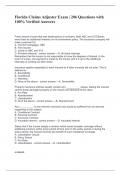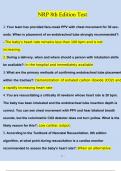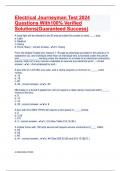Exam (elaborations)
ENG1503 October/November 2024 | Due 23 October 2024
- Institution
- University Of South Africa (Unisa)
ENG1503 October/November 2024 | Due 23 October 2024. Both Questions answered. INSTRUCTIONS: There are TWO essay topics in this examination paper. Choose ONE essay topic. Your essay of choice should be 500 words in length (approximately 1 ½ to 2 pages). Write down only the question number (e.g.,...
[Show more]












